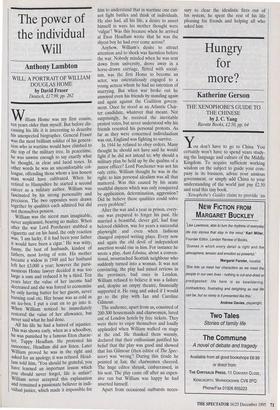The power of the individual Will
Anthony Lambton
WILL: A PORTRAIT OF WILLIAM DOUGLAS HOME by David Fraser Deutsch, £17.99, pp. 262 William Home was my first cousin, ten years older than myself. But before dis- cussing his life it is interesting to describe his unexpected biographer. General Fraser was the most brilliant soldier of his genera- tion who in wartime would have climbed to the top of the military tree. In peacetime, he was unwise enough to say exactly what he thought, in clear and lucid tones. In other words he was an uncomfortable col- league, offending those whom a less honest man would have cultivated. When he retired to Hampshire he started a second career as a military author. William was fascinated by his strong personality and precision. The two opposites were drawn together by qualities each admired but did not themselves possess. William was the nicest man imaginable, never unpleasant, bearing no malice. When after the war Lord Porchester stubbed a cigarette out on his hand, the only reaction was, 'I am lucky, if it had been your father it would have been a cigar.' He was witty, funny, the best of husbands, kindest of fathers, most loving of sons. His mother became a widow in 1948 and her husband left her £3,000 a year; however the parsi- monious Home lawyer decided it was too large a sum and reduced it by a third. Ten years later the value of her income had decreased and she was forced to economise by only having butter for her guests, never burning coal etc. Her house was as cold as an ice-box. I put a coat on to go into it. When William noticed he immediately restored the value of her allowance, but never said what he had done.
All his life he had a hatred of injustice. This was shown early, when as a schoolboy, he was punished by a famous Eton charac- ter, Tuppy Headlam. He protested his innocence, Headlam did not listen. Later William proved he was in the right and asked for an apology; it was refused. Head- lam told him, 'You should be grateful, you have learned an important lesson which You should never forget, life is unfair!' William never accepted this explanation and remained a passionate believer in indi- vidual justice, which made it impossible for him to understand that in wartime one can- not fight battles and think of individuals. He also had, all his life, a desire to assert himself in ways his mother thought were `vulgar'! Was this because when he arrived at Eton Headlam wrote that he was the shyest boy he had ever come across?
Anyhow, William's desire to attract attention and to shock was harmless before the war. Nobody minded when he was sent down from university, drove away in a horse-drawn carriage, flirted with social- ism, was the first Home to become an actor, was ostentatiously engaged to a young actress whom he had no intention of marrying. But when war broke out he annoyed even his friends by standing again and again against the Coalition govern- ment. Once he stood as an Atlantic Char- ter candidate, whatever that meant. Not surprisingly, he received the inevitable protest votes, but never understood why his friends resented his personal protests. As far as they were concerned individualism was out, England was fighting to survive.
In 1944 he refused to obey orders. Many thought he should not have said he would fight if he did not intend to; why should a military plan be held up by the qualms of a junior officer? Lord Porchester was not his only critic. William thought he was in the right: to him personal idealism was all that mattered. Was this caused by his acute youthful shyness which was only conquered by application, determination, aggression? Did he believe these qualities could solve every problem?
After the war and a year in prison, every- one was prepared to forget his past. He married a beautiful, clever girl, had four beloved children, was for years a successful playwright and even when fashions changed enjoyed writing plays. Every now and again the old devil of independent assertion would rise in him. For instance he wrote a play, Aunt Edwina, about a conven- tional, moustached Scottish neighbour who suddenly turned into a woman. It was not convincing, the play had mixed reviews in the provinces, bad ones in London. William refused to believe it was a failure and, despite an empty theatre, financially supported it. He rang and asked if I would go to the play with Ian and Caroline Gilmour.
The audience, apart from us, consisted of 200-300 housemaids and charwomen, lured out of London hotels by free tickets. They were there to enjoy themselves and loudly applauded when William walked on stage at the end. He thanked them warmly, declared that their enthusiasm justified his belief that the play was good and showed that Ian Gilmour (then editor of The Spec- tator) was `wrong'! During this tirade he pointed at Ian; the charwomen cheered. The huge editor shrunk, embarrassed, in his seat. The play came off after an expen- sive run but William was happy he had asserted himself.
Apart from occasional outbursts neces- sary to clear the idealistic fires out of his system, he spent the rest of his life pleasing his friends and helping all who asked him.










































































































 Previous page
Previous page